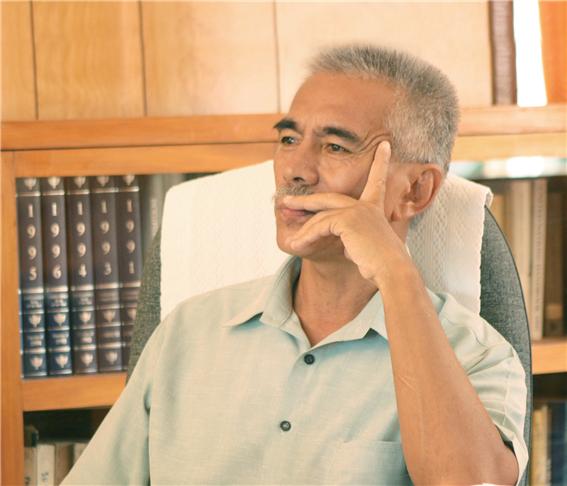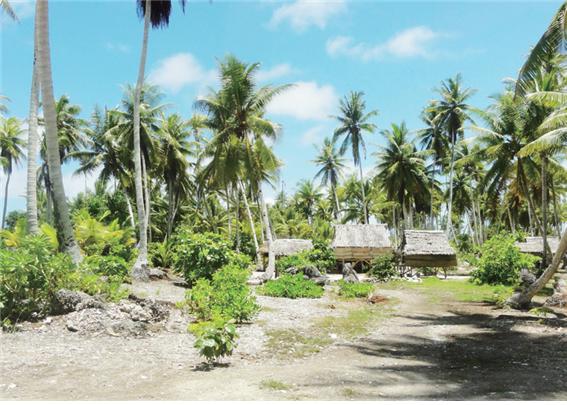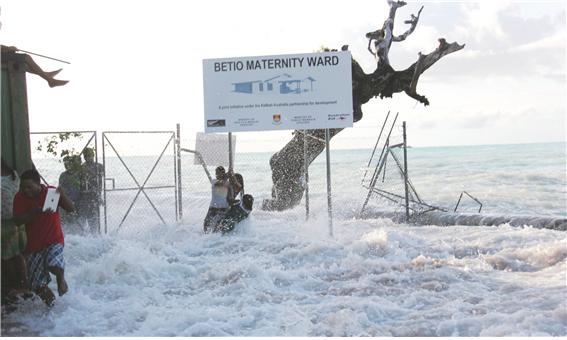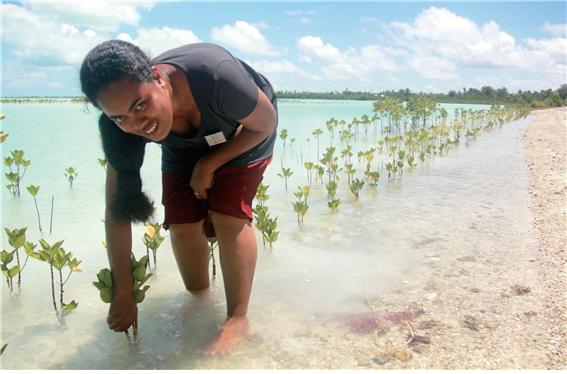키리바시공화국 아노테 통 대통령 단독 인터뷰Republic of Kiribati President Anote Tong’s interview
키리바시 공화국에서 만난 아노테 통 대통령은 별장에서 잠시 휴식을 취하고 있었다. 한국에서 온 기자단과 국제청소년연합의 이헌목 사무총장을 기쁘게 맞이한 대통령. 단독 인터뷰를 하는 내내 그는 깊은 생각에 잠기며 말했다. 언론은 키리바시 국민의 이주에 대해 주목하지만, 아노테 통 대통령이 궁극적으로 원하는 바는 달랐다.
키리바시 공화국의 국민들이 해외로 이주하기 보다 지금의 키리바시 공화국을 기후 재앙으로부터 보호하고 자국민이 지속적으로 삶을 영위할 수 있도록 하는 것이었다. 국민의 교육 수준을 높이고, 미래의 일꾼들을 키워 키리바시 공화국을 보존하기를 원했다. 그는 국제사회가 오존층 파괴의 심각성을 바로 알아 함께 보호하기를 촉구했다. 기후 변화는 단순히 키리바시 공화국에만 국한된 문제가 아니라 지구촌의 문제이기 때문이다.

A. I really cannot recall any single person being my role model, for I had several people I looked up to throughout my life. I spent the majority of my youth in New Zealand and I recall a lot of children my age who were very much infatuated with rugby players, but I was not. The people I grew to admire were individuals who were very disciplined. It was their discipline, which I found to shape my very own life. In the next phase of my life, the people who were instrumental in shaping me were from a theological background. I learned the importance of discipline from them in order to get things accomplished.
Q. During your youth, you studied abroad in England. May you inform us on how your studies in England influenced you?
A. I actually s pent m ore t ime i n New Zealand, and only later on did I go on to England. Therefore England was a very short spell for me because I was there for my post-graduate studies for 2 years and one more year afterwards. If anything, it was New Zealand which shaped and influenced my life tremendously because I went there when I was very young. I completed my secondary and university education there and the experience taught me to be able to exist with people of different cultures, be more accommodating, and to be much more considerate for others. I strongly believe that it is important for young people to be broad-minded, to learn, and to live with others because then they learn to be more tolerant and understanding.
Q. I was ni formed that your age si over 60, but you are still traveling all around the world in order to emphasize the importance of publication on the environment. You want the international society to be informed on the current issues of Kiribati. May you tell us your secret to being able to work so passionately and be so active?
A. The secret is: my grand children. I have many grand children and it is them who drive me and give me the passion and dedication to carry out this duty, because it is associated with their future. I do not want to leave this life without having done anything to even address the issue at hand, because it is a very complicated issue. It involves different countries, but I think what many people miss out on is that it also involves all of humanity. All of humanity will be affected, however most of the global community have not come to that realization yet. They continue to look at things from their national and own individual perspectives. We have got to be able to look at it from a more global perspective. The planet is in terrible danger. The future of humanity is in terrible danger.

A. Let me clarify the whole issue, because I know the media always tends to focus on maybe what is considered the more radical part of the strategy, which is relocation; in other words migration. However, the comprehensive strategy involves ensuring that our islands will continue to support life. However, that requires a lot of work. I have just recently visited one of our islands, where a lot of digging has been taking place in the lagoon in order to situate the island. Preparations such as this are being done in our country. The point that I keep making is this: in order for our people to be able to continue to stay in their homeland, a lot of work has got to be done and a lot of resources are going to be required. But so far, the international community has not been able to make any firm commitment that the resources will get delivered to us. We cannot do it on our own, because we don’t have enough resources. So, whatever it is we can do, it will never be adequate to accommodate the entire population. There will be a huge loss of landmass and so Migration With Dignity is our last resort. But even if that is a fall back choice for our last resort option, we still have to prepare. I want to avoid a situation which is happening in Europe at the moment, where there is a mass migration of people and Europe is not ready, because they thought that it would not happen. They hoped it would not happen. but it happened, and they were not ready for it at all. What I am doing is preparing for all the possible outcomes. We are already providing training for people and hopefully, they will make their own choices, especially the young people, to migrate on merit, so that they will not migrate as refugees but as people with skills. I think it is much more painless, and will be mutually beneficial. For the country they migrate to, it will be beneficial because the country will be receiving skilled people. The people who just simply migrate, wherever they go they will be treated as second class citizens. However if they are skilled: they will be worthwhile, dignified people.
Q. So you would like for them to be part of the elite class in society?
A. I hope so. For those who go to New Zealand, I hope that one day, one of our people will even become a prime minister. It is my deepest hope.
Q. Are there any drills or training that have been prepared for the residents for the year 2050, when the land becomes submerged in seawater?
A. I think a lot of people miss the point, because ill take place over decades and so we will experience much damage on the way. We have already witnessed the damage today and it is going to escalate quickly, and become more severe in 5 to 10 years time. Therefore, I do not think it will even occur by 2050. if we do not do anything, it will occur much sooner than that. The year 2050 is only an estimate figure, I am not exactly precise with my calculations for I am no scientist.
Q. In the case where it occurs progressively, are there any training, drills, or exercises that the people must do?
A. We are training the people to migrate away from here before it even happens, because when it does happen, there is nothing that can be done. There is no specific training at all. We are just preparing them to migrate when necessary. It is a part of their repatriation process.
Q. I am informed that the sea of Kiribati can be used as resources for food and tourism and that you recently made the near-by Phoenix island a protection zone. Once it is designated as a protection zone, the island area cannot be used for tourism, fisheries, nor food and profits cannot be made. This could potentially damage the economy of Kiribati, and so many people are wondering why you made that huge decision?
A. Well, it’s a sacrifice, because in order to tackle climate change, it requires sacrifice and commitment. Without that, we will never be able to address this critical issue. By carrying out this action, I gave out a message to the international community that they also need to take action. The important point that many people miss is that we have been plundering the Earth and taking everything. We must conserve. Thus, the designating of thousands of square kilometers as a marine protected area, was so that we do not ever over-fish again. It is to ensure that the next generation will have a sufficient amount of fish and even the generation afterwards. Selfish people only think about making profits for themselves, but it should not be about them or the profit, because the more they profit they are actually taking away from the future generation. That is the point I am trying to get across and that is where we are at now. In the past, we just pursued development without any consideration for what it will cost the future generation.

A. I think it’s important too for t he people to k now, because t he people and t he government are different and I always make that point clear. People are people, and so they have human feelings and compassion. Governments do not have that, and that is the problem because governments always worry about their next election and the GDP. They all worry about economic growth because if economic growth slows down, then they lose the next election. Their priority is solely to pursue that. That is going to eventually damage the environment. But they do not care because as politicians, all they care about is being elected for the next election. Therefore we need people, statesmen and global leadership; not national leaders, because as I said before, climate change is not about one country alone. It is about the entire global community. Countries are making these decisions individually. For example, in Australia some of the leaders don’t believe this is important and they disregard the fact that what they are doing is actually destroying our future. There is no law because there is no legal arrangement. If there was a law, they should be in jail because of the damage being done to our future. In terms of justice, there is no justice. It is not fair. This is what I have been talking about to the international community; it is a sick form of justice. Even though their brain and heart tells them “you’re wrong”, selfish people are more concerned about their standard of living and welfare and not about what it will cost nor means to the country next door. That is not moral and is not just.
Q. Are there any plans in mind to slow down the rate of global warming?
A. I am no scientist myself, however scientists have made the report and they say that the temperature should be prevented from increasing by 1.5 degrees, nevertheless, the best solution is to have no temperature increase, to reduce carbon emission, and prioritize energy conservation. I am fully aware that there needs to be a balance, and it order to get it done we have to make a lot of sacrifices, and this is the point that I am always making. We have to make a sacrifice so that our future generations can survive. Unfortunately in Australia, some leaders do not care because they think there will be enough resources for the future generations. However, probably by our next generation, there will be many problems, and the generation afterwards may have no hope. Do people really care? Are they considering what tomorrow will cost? Do they have an obligation, to implement actions and avoid doing things that will harm other countries? I believe there are people who think in this manner, even though it is not a convenient road. They are moral people, people that are just, and do the right things. The moral way is the right way. We have got to be moral human beings. We have got to stop being profiteers and not be selfish. We must think about others.

아노테 통 대통령은?
1951년 키리바시에서 출생한 그는 1994년 국회의원에 당선되었고, 자연개발부 장관을 거쳐 현재 대통령으로 기후변화에 맞선 노력을 하고 있다. 키리바시공화국의 40만 km²를 해양보호공원으로 지정(2006) 하여, 국제사회의 관심을 이끌어냈다. 태평양해양경관 제안, 키리바시 국가 기후변화 적응 프로그램(KAP) 추진, 존엄한 이주(migration with dignity) 프로그램을 추진 중이다.
국제사회의 무관심에서 관심을 이끌어낸 그는 이제 함께 행동해주기를 요청하고 있다.
2008년 데이비드 스톤상, 2009년 빛나는 옥색 대수장, 2012년 피터 벤츨리 해양상, 2015년 선학평화상을 수상했다.
Who is President Anote Tong?
Born in Kiribati in 1951, he was elected as a member of parliament in 1994, and went from being the Minister of Environment, Lands, Agricultural Development to President, and is putting in much effort for climate change. He designated Kiribati’s 40,000 km² of land as a protected marine park, and gained international attention. He proposed the Pacific Ocean Coastal Landscape, climate change confronting KAP program and migration with dignity program. After having changed the international society’s disinterest to interest, he is now calling for global citizens to prepare a solution to climate change.
담당 | 김민영 편집장 어시스트 | 함석현, 홍바울 디자인 | 전진영 기자
자료제공 | 키리바시 정부 홈페이지
Interviewed by Jun-ha Lee Edited by Min-young Kim Assisted by Joey Hahm, Bawool Hong Designed by Jin-yeong Jeon Photo adopted from www.climate.gov.ki

